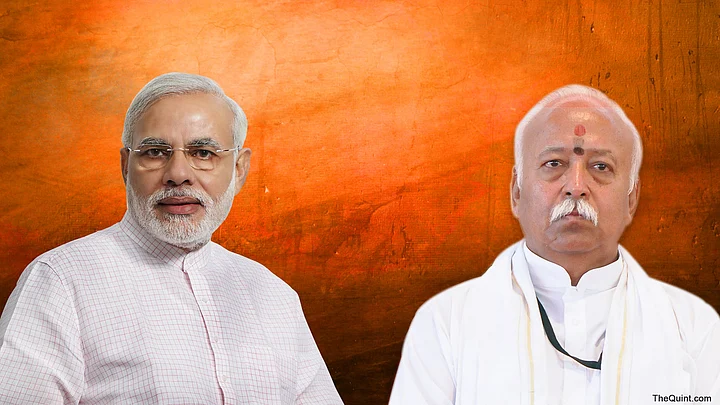In the recent past, elements of conservative Hindu culture have been revived with vigour, often at the expense of centuries of Islamic identity.
In the midst of this however, Urdu as a form of expression – rather than strictly a language – is being used peculiarly by nationalist entities to simplify complex meaning, and convey certain emotions.
Popularised in India by the Mughals, the influence of Urdu, from being a language of the Darbaar, has waned with time. Despite being a national language which has always been rooted in our history, it’s influence has been peeled back from many dialects – leaving it’s speakers only a scattered minority.
The use of the term Hindustani by eminent figures such as Premchand – to describe their language of use – displays how interlinked Urdu is with modern day Hindi.
In light of these developments, however, the use of Urdu by proponents of Hindu cultural identity and Sanskrit-ised speech like Mohan Bhagwat and PM Narendra Modi is somewhat ironic. Their use of the language to express ideals eloquently as well as break the flow of complex, Sanskrit-influenced Hindi, is slowly become a larger part of their oratory habits.
Among his attributes, the skill of oration has become a cornerstone in Modi’s political career at the helm of the nation. Since becoming PM, however, he has used Urdu phrases and elements of the language’s culture to express himself in a more eloquent manner.
During his address on New Year’s Eve, Modi used many Urdu words to simplify passages that might otherwise seem incomprehensible to non-native Hindi speakers. His use of urdu words such as Hindustan (India), afsat (authority), badlav (change), Saza (punishment), Kanoon (justice), though not prominent in his narrative, were used to illustrate important points in his national address.
His use of Urdu was more sharp and evident during the March 2016 session on the Rajya Sabha, where he used a Shayari – an important linguistic tradition rooted in Urdu – to deliver a sharp jab to the Congress.
Commenting on their lack of strong leadership, leaving most of its members lost, Modi made the Rajya Sabha floor his own platform for Poetry.
If you can walk, then come. If you can walk, then come, everyone is part of the crowd, if you can escape it, then come.Narendra Modi, Prime Minister
In effect, Modi cleverly subverted the poetic culture of Shayaris to make his own political point, without highlighting any fact or incident to substantiate his criticism. His response however, was met with the unsurprising amounts of praise, applause, and admiration.
In his annual Dussehra address in Nagpur, Mohan Bhagwat took to the stage to praise the surgical strikes as well as the efforts of gau rakshaks before coming to his primary point of India’s continuing battles in Kashmir. He claimed that all of Kashmir belonged to India, and spoke at length of the need to promote, consolidate and establish ‘nationalistic identities’ and forces in the valley.
His use of Urdu poet Allama Iqbal, which brought his point of nationalistic identity home most sharply, was as ironic as it was impressive.
“Yunan-o-Misr-o-Roma sab mit gaye jahan se ab tak magar Hai baki Naam-o-nishan hamara, Kuchh baat hai ke hasti mit’ti nahin hamari Sadiyon Raha Hau Dushman Daur-e-Zaman Hamara”
Egyptian civilisation and Roman civilisation have all vanquished from this world but even today we are here. There is something in this soil that helped us survive innumerable enemies.Allama Iqbal: Urdu Poet, Philosopher & Politician
The juxtaposition of Bhagwat’s desire to rid Kashmir of Muslim Militancy – and his use of Urdu to bring the point forward, shows that the linguistic culture is very much alive in Hindi speech.
One can only speculate about the thought process behind this, however the RSS’ attempts to reach out to a wider audience have been notable. Muslim Rashtriya Manch (a Muslim organisation and affiliate of the RSS) has noticeably been more active in associating Muslim culture with Hindu beliefs since 2012, when they advocated strongly for Narendra Modi’s leadership.
Throughout the years, Urdu has been used by eminent poets and the like to propagate poetry, to give a voice to that which cannot be simply articulated. It has been rooted in the linguistic identity of our nation for centuries.
The fact that Urdu is being used by proponents of strong Hindu and Sanskrit, gives more credence to the language as an essential part of modern day Hindi. While the Urdu-speakers in our nation remain a minority, the use of the language by Modi and Bhagwat shows that the emotional effect that Urdu adds is far from lost.
(At The Quint, we question everything. Play an active role in shaping our journalism by becoming a member today.)
